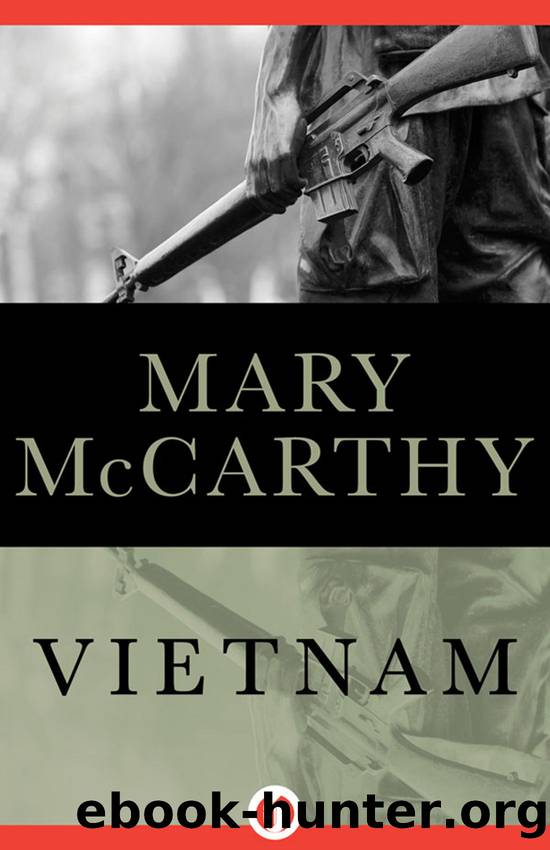Vietnam by Mary McCarthy

Author:Mary McCarthy [McCarthy, Mary]
Language: eng
Format: epub
ISBN: 978-1-4804-4116-3
Publisher: Open Road Media
Published: 2013-09-11T19:31:00+00:00
Intellectuals
âIL FAUT UNE REVOLUTION!â Major Be said, letting the r roll like a cannon ball in the school at Vung Tau. The Italian general listened with an air of dawning surprise. The short broad-faced Vietnamese major was not a military chieftain of the NLF, but the head of the government school for Revolutionary Development, training anti-Communist cadres. The former Italian Chief of Staff and I were being briefed in French by Major Be in a small classroom, while in the next room a group from NBC was being briefed in English by his assistant, Mr. Chau. Thin, slight Mr. Chau, dressed in flowing black calico trousers and a tight black tunic resembling an alb, had taken a degree in English literature at the Sorbonneâhe had done his doctoral thesis on Virginia Woolf. Major Be, less at home in foreign languages, wore a black shirt open at the throat and black trousers cut like army fatigues. Their costumes were symbolic of the aims of the program. The 3,000 cadres now in the school (a cadre is one person), when they graduated, would start âconstructingâ hamlets in teams of fifty-nine, wearing the black-pajama garb of the Viet Cong, which itself had been copied from the dress of the poor peasants. Actually, the peasants today in government-controlled areas wear a medley of clothes, including baseball caps, shorts, and T-shirts; and the RD getup, I heard from a Vietnamese medical student, was regarded as ludicrous in the hamlets he had been visiting during TêtââIf they would only take off those silly pajamas, the people might not laugh at them.â
âVraiment une révolution,â Major Be insisted. The Italian general cast an inquiring look at me. âQuâest-ce quâil veut dire par ça?â he murmured. I did not know what Major Be had in mind when he said that his country had to have a revolution, though I agreed with him, whatever he meant. It was monotonous to hear everywhere the same stories of graft and thieving at the expense of the poor; only yesterday an unusually frank OCO man had been telling about what had happened with a distribution of clothing donated through AIDâthe best clothes had been pilfered by the authorities and never reached the needy. To receive aid at all, he said sadly, poor families had to qualify as needy with the government. âYou mean they had to pay to qualify as needy?â He looked at me in silence, by way of an answer.
Still, the briefing I had already had in Saigon on the RD program had hardly prepared me to meet a doctrinaire theoretician of the type of Major Be, who, warming to his subject, was now assuring us that Vietnamese society was âcomplètement corrompueâ: the ruling classes, he said, as the generalâs eyes widened, had always used the laws to serve their own interests. Then, glancing at his watch, he switched to facts and figures.
The program had been started in December 1965. Twenty-eight thousand cadres were already in the field. The school training
Download
This site does not store any files on its server. We only index and link to content provided by other sites. Please contact the content providers to delete copyright contents if any and email us, we'll remove relevant links or contents immediately.
Melania and Me by Stephanie Winston Wolkoff(1059)
Orlando by Virginia Woolf; Mark Hussey(1043)
The Class of 83 by Hussain Zaidi(1002)
Live in Love by Lauren Akins & Mark Dagostino(979)
Dancing in the Mosque by Homeira Qaderi(969)
A History of My Brief Body by Billy-Ray Belcourt(910)
Virginia Woolf by Between The Acts(794)
Just as I Am by Cicely Tyson(764)
The Common Reader, Book 1 by Virginia Woolf(763)
Stranger Care by Sarah Sentilles(757)
Robespierre: A Revolutionary Life by Peter McPhee(752)
The Schoolgirl Strangler by Katherine Kovacic(745)
1914 by Luciano Canfora(737)
Ariel (english and spanish Text) by Sylvia Plath(728)
Unforgetting by Roberto Lovato(727)
Paris Without Her: A Memoir by Gregory Curtis(718)
Harriet Tubman: The Biography by University Press(717)
Broken Horses by Brandi Carlile(717)
Berlin Diary: The Journal of a Foreign Correspondent 1934-41 by William L. Shirer & Gordon A. Craig(712)
